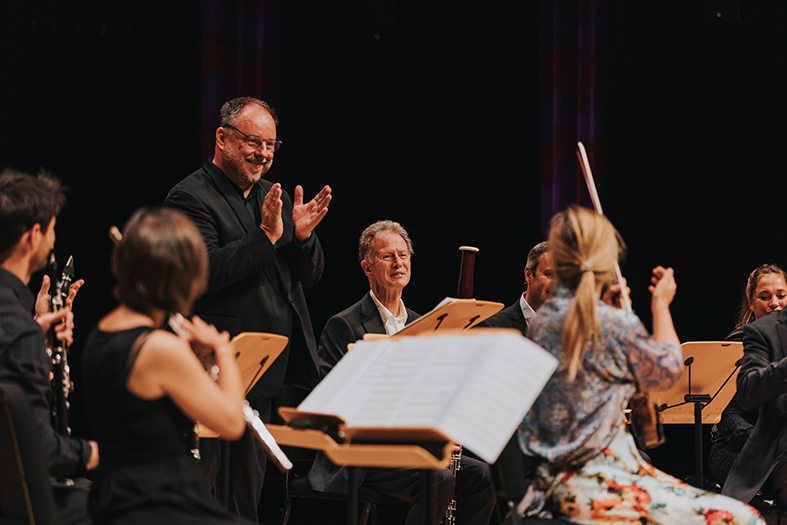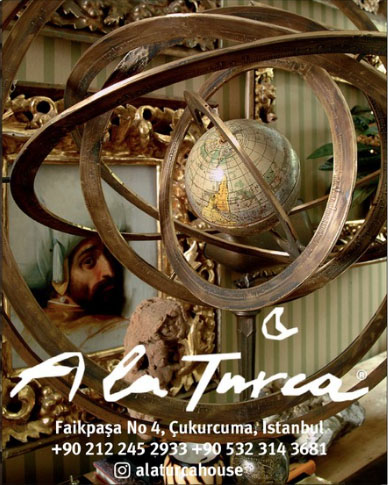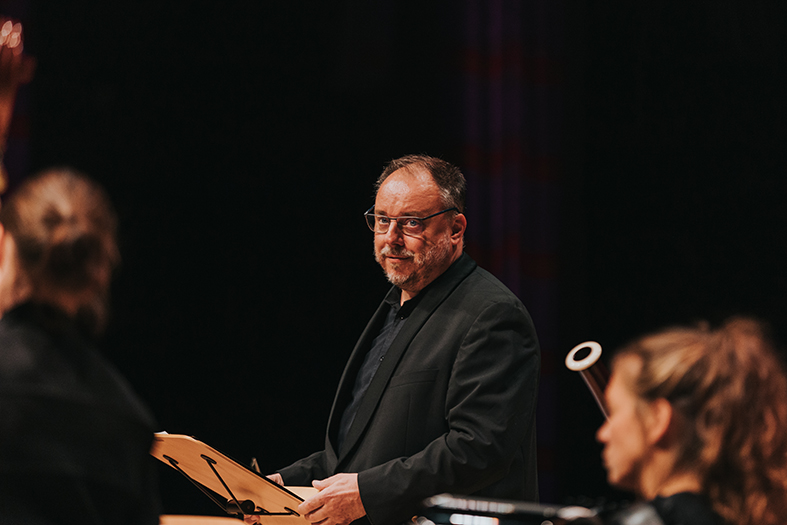
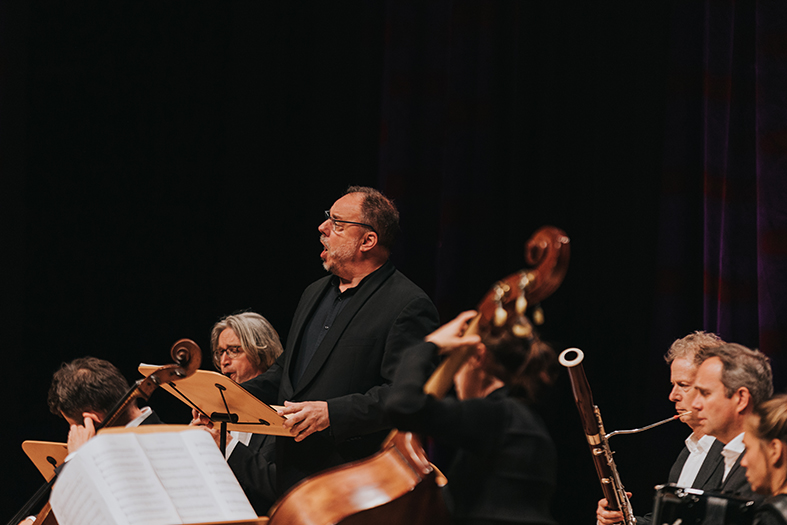
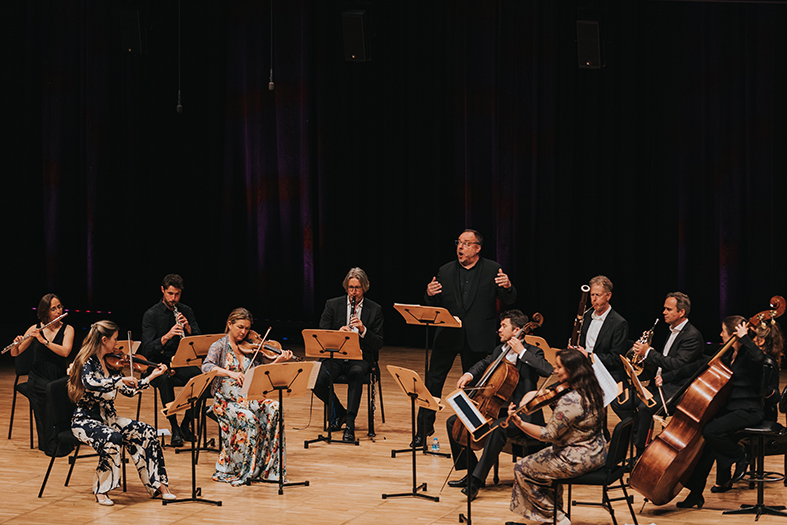
Festival feast: Matthias Goerne performing with the Amsterdam Concertgebouw Chamber Orchestra at the Reşit Rey Concert Hall, June 9, 2023 (photos: Salih Üstündağ)
The second of the events in the 51st İKSV Music Festival that I attended was a concert given by German baritone Matthias Goerne and musicians from the Amsterdam Concertgebouw Chamber Orchestra. The proceedings – at the Cemal Reşit Rey Concert Hall in Harbiye on Friday – opened with an instrumental number: the Old Hungarian Ballroom Dances by György Ligeti (1923-2006). Ligeti himself described the composition of this work as follows:
While I was still a student at the Budapest Music Academy in 1949, I was requested by public radio to cultivate the ‘national heritage’ by writing a suite on dance melodies of the Biedermeier period, that is, around 1800. The Régi magyar társas táncok (Old Hungarian Ballroom Dances, 1949) are therefore not my own composition, but only a selection of dance tunes by Lavotta, Bihari, Csermák and Rózsavölgyi, which I orchestrated for flute, clarinet and strings.
Marked by an emphasis on ‘traditional values’, the ‘Biedermeier period’ was the era of stability and middle-class expansion in Central Europe that began in the early 19th century and ended with the revolutions of 1848. And speaking of eras, the years after the Second World War were by no means a walk in the Margitsziget Park for composers in Hungary: they were obliged to work within the restrictions imposed by the communist régime, completely cut off from developments in the rest of Europe. (In fact, when Ligeti fled to Austria following the suppression of the Hungarian uprising in 1956, he immediately plunged himself into the most avant-garde musical milieu he could find.) Some critics have claimed that with the somewhat stilted treatment of the opening theme of Old Hungarian Ballroom Dances and the gratuitous warbling arpeggios from the clarinet, the composer was poking fun at the self-important stiffness of The Authorities. Here is a recording of the Old Hungarian Ballroom Dances for which two different groups are credited: the Asko Ensemble conducted by Reinbert de Leeuw, and the Schönberg Ensemble conducted by Ligeti himself.
After this work, more musicians filed in, and I saw that the instrumental group for the lieder was to include not only a bassoon and a French horn, but also an accordion.
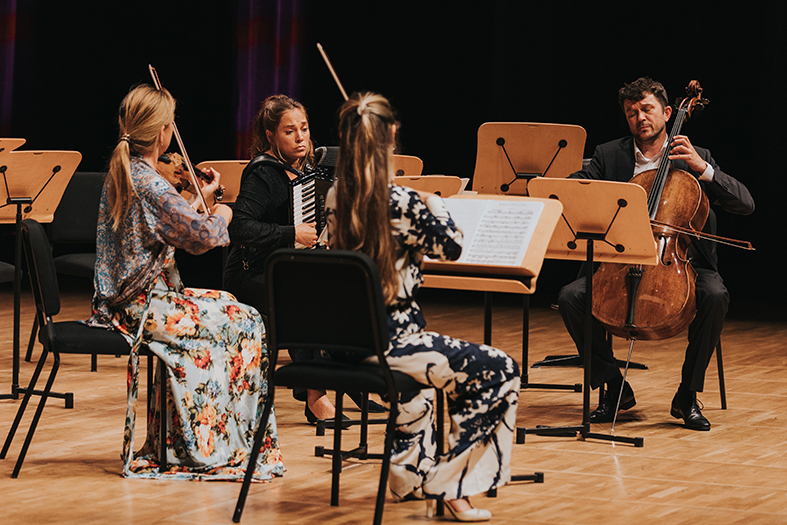
This last addition struck me as being more than a tad adventurous: the idea that high-culture German art songs might be accompanied by such a lowbrow instrument had never occurred to me. Was this lèse-majesté, perhaps? One wondered what Maria Theresa, Archduchess of Austria and Queen of Hungary and Bohemia, would have said, if indeed she had deigned to comment. In the event, however, I saw that the accordion was used mostly to firm up the bass line, and was never allowed to rise above its station. Then the soloist figure marched into view, and the song recital began.
Baritone Matthias Goerne, born in Weimar (then in East Germany) in 1967, was the son of a theatre director. Having decided to become a singer at the age of 9, he sang in the children’s choir in several of his father’s productions in Dresden. From the ages of 18 to 22 he received voice training from Hans-Joachim Beyer in Leipzig. Then in 1991 he won a singing competition in West Berlin and was introduced to legendary singer Dietrich Fischer-Dieskau. Goerne studied with Fischer-Dieskau for three years. This was followed by a similar period of tuition from Elisabeth Schwarzkopf – likewise a name to conjure with. From 2001 to 2005 Goerne taught as Honorary Professor of Song Interpretation at the Robert Schumann Hochschule in Düsseldorf. Among his recent projects is a series of three lieder albums, recorded for Deutsche Grammophon, with pianists Jan Lisiecki, Seong-Jin Cho and Daniil Trifonov.
His programme at the Cemal Reşit Rey Concert Hall consisted of works by Franz Schubert, Robert Schumann, Clara Schumann, Antonín Dvořák and Johannes Brahms. I included the following video in my preview of the İKSV Festival; however, as this is the only recording available on YouTube in which he is heard in a selection of songs by Schubert, here it is again:
Now, a recording of Schubert’s Winterreise cycle in which Goerne is accompanied by pianist Christoph Eschenbach. One of the most famous of these songs is Der Lindenbaum (‘The Linden Tree’), which starts at 12:54. As I once heard the late Gerald Moore remark, the accompaniment has a reputation among pianists for being exceptionally difficult: the right hand is required to perform a difficult manoeuvre right off the bat. The ‘swaying-back-and-forth’ effect, however, is magnificent.
By now there should be no need to point out that Matthias Goerne is considered one of the leading performers – if not the leading performer – of German art songs in our time. As a result, the concert on June 9 was an absolute feast of vocal sound, and many thanks must go to the İKSV organisation for providing it. One pleasing feature was the exemplary behaviour of the audience. On this occasion, there were absolutely no ring tones or other importunate beepings to interrupt the performance.
I must confess that I have a special relationship with lieder, having accompanied my bass-baritone father in many of them during my teenage years. Here are some recordings by Matthias Goerne of the songs I remember so well. (None of them was actually on his programme in Istanbul, but what the hell? If I may be excused a somewhat undignified modern expression – for my money, they all rock.)
First, Schubert’s tear-jerking Litanei, D. 343. The pianist is Helmut Deutsch.
For an English translation by Richard Wigmore of the words to this song, we are obliged to the ‘Oxford International Song Festival’ website:
Secondly, Schubert’s Du bist die Ruh, D. 776, with Helmut Deutsch at the piano.
This English translation of the words on the ‘Oxford International Song Festival’ website is once again by Richard Wigmore:
Now for some Brahms: Wie bist du, meine Königin, from 9 Lieder und Gesänge, in which Goerne is accompanied by Christoph Eschenbach.
For a translation of the words see Richard Stokes.
Finally, Robert Schumann’s incomparable Im wunderschönen Monat Mai, the first song in the Dichterliebe cycle. Here, Matthias Goerne is accompanied here by Daniil Trifonov. The unresolved dominant seventh in the last bar, with its poignant suggestion of unfinished business (after all, the darling buds of May don’t last forever), is one of my favourite endings in the whole of classical music.
Richard Stokes’s translation of the words.
